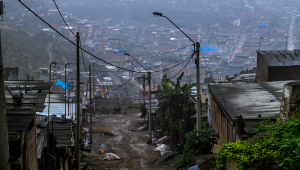Estimates issued by the lender today suggested that “significant new spending” was required on health, education, water and sanitation, roads and electricity, all of which are “critical” for sustainable and inclusive growth.
The fund examined spending needs across 49 low-income developing countries.
It concluded that annual outlays would need to be 14 percentage point of gross domestic product on average with many countries, including Benin and Rwanda, needing to spend more than this.
Discussing the findings in a speech to the UN secretary general’s high-level meeting on financing sustainable development, managing director Christine Lagarde said countries had “substantial scope” to raise tax.
“An ambitious but reasonable target for many countries is to increase their tax ratio by five percentage points of GDP,” she said, acknowledging that such a move would require “strong administrative and policy reforms”.
A boost to tax revenues in this range would put the SDGs within reach for emerging market economies like Indonesia, but not be sufficient to help the world’s poorest countries, which would continue to require support from international donors and the private sector, Lagarde said in an accompanying blog authored with Vitor Gaspar, head of the IMF’s fiscal affairs department.
Low-income countries were also encouraged to “own the responsibility” for achieving the goals.
“Country efforts should focus on strengthening macroeconomic management, enhancing tax capacity, tackling spending inefficiencies, addressing the corruption that undermines inclusive growth, and fostering business environments where the private sector can thrive,” Lagarde told the UN meeting in New York.
But she warned against poor countries taking on too much debt from the international financial markets and lenders. According to the IMF and World Bank, 40% of low-income countries are at high risk of debt distress or already in debt distress.
Lagarde singled out Indonesia as a country making good progress towards the SDGs and demonstrating that development and economic growth go hand in hand.
She also highlighted good governance and anti-corruption measures as among the main foundations to supporting stable growth.
The role of governance in delivering the SDGs was considered at CIPFA’s recent international conference in Abu Dhabi.
Vivi Niemenmaa of the European Court of Auditors said: “There are no SDGs without good governance.”
Achieving the SDGs demands a whole-of-government approach and long-term perspective, she told delegates.













